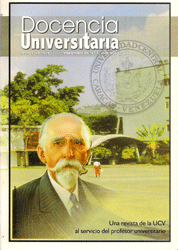El Estado Docente: Reflexiones para el Análisis y una Mirada al Caso de Venezuela (Del siglo XIX a 1945-1948)
Palabras clave:
Estado Docente, legislación escolar, alfabetización, sociedad educadora, the teaching institution, school legislation, literacy, societyResumen
El debate sobre la problemática educativa actual incluye el tema del Estado Docente como asunto polémico referido a las posiciones contrapuestas respecto al papel del Estado en la educación. El propósito de este trabajo es plantear, por un lado, algunos elementos conceptuales y metodológicos en relación con el tema y, por el otro, examinar brevemente lo que significa el principio del Estado Docente en Venezuela desde el siglo XIX hasta el trienio 1945-1948, período en el cual se ubica la emergencia de este postulado en la vida educativa del país. A fin de contribuir a enriquecer la discusión sobre la responsabilidad del Estado en educación, proponemos superar dos tipos de vacío que hemos observado en la polémica: La carencia de contextualización conceptual y teórica y la ausencia de contextualización socio-histórica. En tal sentido, presentamos un análisis histórico del desarrollo conceptual y de las formas de concreción real que el principio del Estado Docente ha experimentado. A modo de conclusión, es posi le observar que, en el período estudiado, se evidencia una gran desproporción entre las varias referencias hechas a las responsabilidades educativas del Estado recogidas en Constituciones, Leyes, Códigos y Decretos, por un lado, y el muy precario espacio ocupado por el cumplimiento o ejecución de tales obligaciones, por el otro. Los importantes esfuerzos por impulsar en el ámbito de la legislación la responsabilidad educativa del Estado no se vieron suficientemente revertidos en la práctica. Los logros en materia de recursos invertidos en educación, en expansión matricular y en procesos de alfabetización, están acompañados por una baja capacidad por mantener en las aulas escolares a los estudiantes y por serias deficiencias en los principios de equidad y calidad de la educación.
Abstract
The debate over the current educational problems includes the theme of the State’s roll in Education, which exists as a polemical matter, referring to counter positions on the subject. The objective of this paper is two-fold; the first objective is to raise some conceptual and methodological elements related to the topic. The second goal is to briefly examine what the purpose of the Venezuelan State has being on educational matters dating from the nineteenth century up to the period of 1945-1948. During this period, an emergency arose regarding the statute that determined the role of the Teaching Institution in the country’s educational system. In order to enrich the discussion about the responsibility of the State in educational matters, we propose to overcome two types of obstacles that have been noticed in this debate. The obstacles include the lack of theoretical conceptualization and the absence of a socio-historical conceptualization. By so doing, we present a historical analysis of the conceptual deve opment and the varying concepts that have been attempted by the Teaching Institution. In conclusion, it is possible to observe that in the above-mentioned period, there is plenty of evidence of a great discrepancy between the various references made and the educational responsibilities of the State as recognized in the Constitutions, Laws, Codes, and Decrees. On the other hand, there is limited time for the execution and accomplishment of such obligations. The necessary initiatives were neither practical nor feasible. The acquisition of resources to be invested in education and the expansion of students’ registration literacy processes have been constantly accompanied by a low capacity to maintain students in school and for serious deficits of equity and quality of education.


